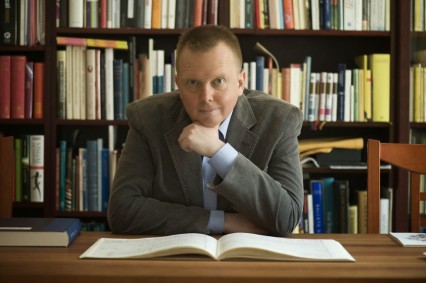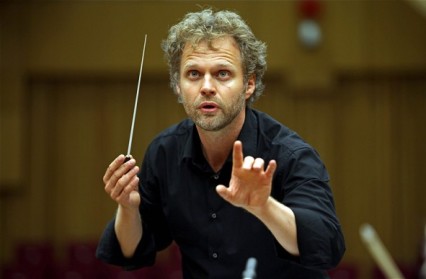Simon Rees is at Cardiff’s St David’s Hall to review a performance of the BBC National Orchestra of Wales, conducted by Thomas Søndergård.
‘Conductor’s music’ isn’t always used as a term of praise, and can refer to flashy, shallow showpieces, more dazzle and display than substance and structure. That doesn’t have to be the case, though. Both works in this, the final concert of the BBC National Orchestra of Wales’s season, were by composer-conductors, and showed distinctive signs of this in their virtuosic writing for huge orchestral forces, worthily realised by the orchestra and chorus under the baton of Thomas Søndergård, the orchestra’s Principal Conductor. B. Tommy Andersson is a Swedish composer and conductor who has been Composer-in-Association with the BBC National Orchestra of Wales for a productive and interesting season. His Satyricon, based on Petronius’s scabrous, sexually-explicit novel, is labelled as a ‘choreographic poem’ but might equally well serve as a ballet score. Andersson wrote it in memory of his friend the dancer and choreographer Per Jonsson.

Andersson is particularly fond of using large, complex percussion ensembles, and these drive the dance-like rhythms of Satyricon, with Spanish castanets, a ship’s brass bell, splash cymbal, tubular bells and log drum all adding to the passionate, tumultuous pace of the central sections. The opening is ‘secretive and quiet’, rustling in with glissandos on muted strings, but the pace soon picks up, taking on burlesque overtones in the central section. Andersson likes to use descending arpeggios as a kind of ostinato, and has other ostinato figures and sequences providing a useful means of navigating through the complexities of the score. The conclusion is an onslaught of full-orchestral sound, whipped up to an ‘exhilarated frenzy’ (the marking in the score at this point) by Søndergård, who clearly has a great affinity with Andersson’s music, and who has ably promoted it throughout this season.
Mahler’s Second Symphony, ‘Resurrection’, is one of the greatest works an orchestra, chorus and soloists can undertake, and this performance was greeted with great – and fulfilled – expectation by the pleasingly large audience in St David’s Hall and (one hopes) by the listeners to the live broadcast on BBC Radio 3. The sight of a large Welsh choir filling the tiered seating behind the orchestra is awe-inspiring enough to begin with, and the assembly of horns (all twelve of them), trombones, tuba, trumpets and timpani would gladden the heart of any brass-band enthusiast, and there are still plenty of those in Wales.
Thomas Søndergård’s authority was clear from the opening declamation from cellos and basses, and the plaintive response from oboe and cor anglais. The shape of the first movement, which is itself broken up into several sections, held together impressively, and the underlying feeling of a narrative (Mahler rejected his earlier programmatic interpretation of the piece) came strongly through. The movement, named ‘Totenfeier’ or ‘Funeral Rites’ is an extended funeral march. The whole symphony is constructed to establish the reality of death, followed by recollections of past life by the deceased, and the hope of resurrection.
I find it odd that Mahler is generally classed as an Austrian composer (which he was, as his birthplace in Bohemia was part of the Austrian empire, and he was born in 1860, seven years before Austria and Hungary were united by the Ausgleich of 1867) when his music has so many clearly Bohemian elements. Melodies, rhythms, fanfares, trumpet calls and marches all recall the Czech lands where he was born and brought up, although Mahler himself does not seem to have been a Czech speaker.
In the second movement, we are firmly on Austrian soil, with a gentle Ländler, the precursor to the livelier waltz, as the symphony recalls the pleasures of a life once lived. Thomas Søndergård brought out the delicacy of the writing here, with exquisite playing from the strings and the occasional solo phrase from the leader, Lesley Hatfield. The BBC National Orchestra of Wales is so well-established and well-known in Cardiff that regular concert-goers recognise and relish the solo lines given to their favourite players, and there is a feeling of encouragement and enjoyment as individual instrumentalists are coaxed to allow their own personalities and styles to show through.
The third movement, marked ‘Ceaselessly flowing’ is a merry dance of death to the tune of Mahler’s Wunderhorn setting of ‘St Anthony of Padua’s Sermon to the Fishes’. The melody ripples along, reminiscent of fellow-Bohemian Smetana’s Vltava or even of Grieg’s Anitra’s Dance from the Peer Gynt Suite – or maybe that was just Thomas Søndergård’s Nordic roots showing through.
‘Urlicht’, the fourth movement, introduced the full, expressive voice of Jennifer Johnston, singing a poem from Des Knaben Wunderhorn in which an angel appears to the singer as she goes on her way towards God.
All throughout the symphony, the vast chorus had sat patiently, and their first entry, well into the final movement, was delivered from a sitting position – and, impressively, ‘off the book’ or without sheet music to follow. Soprano Susan Gritton joined Jennifer Johnston as the second vocal soloist, and was thinner-voiced but still impressive. The chorus basses sounded a bit gravelly at first (no chance for a warm-up, perhaps) but with the first ppp contrabass B flats negotiated, they moved into a more secure mode, and the full chorus gave the chorale-like text of Klopstock’s poem and Mahler’s own additions a gravity and splendour that increased as the movement swung towards its shattering, shimmering conclusion.
Photo of Thomas Søndergård by Betina Skovbro
St David’s Hall, Cardiff, June 4 2015
B. Tommy Andersson – Satyricon: Choreographic Poem
Gustav Mahler – Symphony No. 2, ‘Resurrection’
BBC National Orchestra and Chorus of Wales
Conductor: Thomas S
Soprano: Susan Gritton
Mezzo soprano: Jennifer Johnston
Conductor: Thomas Søndergård
Recommended for you:
Nigel Jarrett attended St David’s Hall for a night of Tchaikovsky and Shostakovich with BBCNOW, led by Thomas Søndergård.











